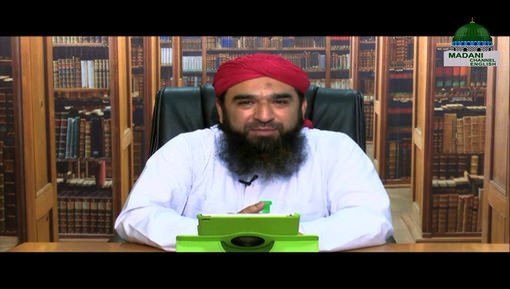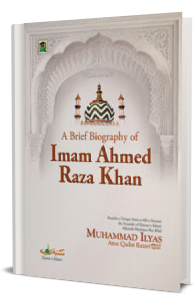
Knowledge is light
A’la Hazrat’s Expertise in the Field of Hadees
Haydar Ali Madani
From the foundational and significant sources constituting Islam’s Shari’ah, the blessed Hadees are of the most importance after the glorious Quran. Just as Muslims seek individual and collective guidance from the glorious Quran for themselves and the people of Allah, they also seek the light of guidance from the luminous Hadees. For protection from misguidance, the second thing that the Beloved Prophet صَلَّى الـلّٰـهُ عَلَيْهِ وَاٰلِهٖ وَسَلَّم prescribed was the blessed Sunnah, which is accessed through the blessed Hadees. The Beloved Prophet صَلَّى الـلّٰـهُ عَلَيْهِ وَاٰلِهٖ وَسَلَّم indicated towards this by saying: ‘I am leaving two things amongst you. For as long as you hold onto them, you will not become astray: The Book of Allah and my Sunnah.’ (Mishkat-ul-Masabih, vol. 1, p. 56, Hadees 186)
Just as it is necessary for a Jurist (faqih) to have an insight into the meanings of the glorious Quran, so too is necessary for him to have knowledge of the blessed Ahadees. Imam Jalal-ud-Deen Suyuti رَحْمَةُ الـلّٰـهِ عَلَيْه mentions that Sayyiduna Abdullah Bin Mubarak رَحْمَةُ الـلّٰـهِ عَلَيْه was once asked, ‘When can someone issue a fatwa (verdict)?’ He replied: ‘When he has knowledge of Ahadees and acumen in deducing by analogy (Qiyaas).’ (Miftah-ul-Jannah, p. 105) From the early stages of Islam to the present day, Islamic jurists (Fuqaha) have held a distinguished rank in the knowledge of Hadees. The names of great scholars of Ahadees (Muhaddiseen) appear in the list of the students of the students of these jurists. Of the recent past, A’la Hazrat, Imam Ahmad Raza Khan Barelvi رَحْمَةُ الـلّٰـهِ عَلَيْه was a figure of admirable spirituality, knowledge and influence. Not only did he have expertise in the branches of religious knowledge, mathematics and other sciences, but as illustrated in his works, he رَحْمَةُ الـلّٰـهِ عَلَيْه also expertly delved into the ocean of Hadees. In endorsing his view and fatwas, at times he would quote a plethora of Hadees in addition to passages of the Quran and works of Fiqh. This plethora of Ahadees would then take on varying forms. For example, they would form a separate monograph, book or [traditional] collection of 40 Hadees (Arba’een) in themselves. Let us take a look at some of these examples:
1. A Muslim should hold the belief that all good and bad happens by Divine decree. To pursue a plan in worldly and religious matters is an excellent way. In responding to a question relating to this, Sayyidi A’la Hazrat رَحْمَةُ الـلّٰـهِ عَلَيْه wrote the monograph اَلتَّحْبِیْرُ بِبَابِ التَّدْبِیْر, which contained many Quranic verses and 40 Hadees.
2. It is a mercy from Allah Almighty for us sinful people that the Beloved Prophet صَلَّى الـلّٰـهُ عَلَيْهِ وَاٰلِهٖ وَسَلَّم will be our intercessor on Judgement Day. Sayyidi A’la Hazrat رَحْمَةُ الـلّٰـهِ عَلَيْه penned a treatise by the name اِسْمَاعُ الْاَرْبَعِیْن فِی شَفَاعَةِ سَیِّدِ الْمَحْبُوْبِیْن in which he presented evidence of prophetic intercession and expounded on its different types. As this work’s foundation is 40 Hadees, it holds the status of an Arba’een.
3. To prostrate for anyone other than Allah Almighty out of respect is impermissible in the Shari’ah of Islam. Its impermissibility is established and unequivocal in Hadees. When A’la Hazrat رَحْمَةُ الـلّٰـهِ عَلَيْه lifted his pen to write on this subject, a complete Arba’een by the name اَلزُّبْدَۃُ الزَّکِیَّة لِتَحْرِیْمِ سُجُوْدِ التَّحِیَّة was produced. Apart from the Arba’een works, when analysing how Sayyidi A’la Hazrat رَحْمَةُ الـلّٰـهِ عَلَيْه would sometimes mention manifold Ahadees to advocate his various fatwas, his expertise in Ahadees becomes evident. Below are some examples.
4. A question was presented to a respectable teacher of
A’la Hazrat, Maulana Ghulam Qaadir Bayg رَحْمَةُ الـلّٰـهِ عَلَيْه regarding some people rejecting the
Prophet صَلَّى الـلّٰـهُ عَلَيْهِ
وَاٰلِهٖ وَسَلَّم as being the greatest of Messengers, and
they asked for evidence from the Quran and Hadees. Replying to their question,
Sayyidi A’la Hazrat رَحْمَةُ
الـلّٰـهِ عَلَيْه said: ‘The issue of the Beloved Prophet صَلَّى الـلّٰـهُ عَلَيْهِ وَاٰلِهٖ وَسَلَّم being the greatest of Messengers and the leader of the first
and last is a matter that is definitive, a matter of belief, certainty, surety,
consensual agreement and faith; only a misled, heretic and satanic individual
would differ on this matter.’ He رَحْمَةُ
الـلّٰـهِ عَلَيْه then referred to 100 Hadees to make this
matter clear. This work was named
‘تَجَلِّی الْیَقِیْن بِاَنَّ
نَبِیَّنَا سَیِّدُ الْمُرْسَلِیْن.’
5. As well as having plenty of other praiseworthy attributes, the Beloved Prophet صَلَّى الـلّٰـهُ عَلَيْهِ وَاٰلِهٖ وَسَلَّم also had the honour of being the Final Messenger and Prophet. When Sayyidi A’la Hazrat رَحْمَةُ الـلّٰـهِ عَلَيْه intended on eradicating the deception and mischief of those who rejected the finality of the Prophet, he wrote a work called ‘جَزَآءُ اللهِ عَدُوَّہٗ بِاِبَآئِهٖ خَتْمَ النُّبُوَّۃ’, in which 121 Hadees and other proofs were included.
6. According to a Hadees, offering Salah whilst wearing an Imamah (i.e. a turban) is 70 times greater than offering it without wearing one. When Sayyiduna Wasi Ahmad Muhaddis Soorti رَحْمَةُ الـلّٰـهِ عَلَيْه enquired about this Hadees, the accomplished Imam Ahmad Raza Khan رَحْمَةُ الـلّٰـهِ عَلَيْه mentioned 20 Hadees on the blessings, merits and significance of the Imamah.
7. Besides the above, on various occasions, he presented 24 Hadees on the creation of angels, 16 Hadees as evidence on embracing, 56 Hadees on the significance of the beard, 91 Hadees on the rights of parents and 27 Hadees on the impermissibility of making photos.
Based on these figures and the other works of Sayyidi A’la Hazrat رَحْمَةُ الـلّٰـهِ عَلَيْه, it is evident that in addition to mastering other sciences, he had an impressive command in the science of Hadees too.
May Allah Almighty also give us the Taufeeq to also pick out flowers from the magnificent garden of knowledge, so that we may also fulfil the duty of guiding and rectifying the Muslim Ummah.


















Comments